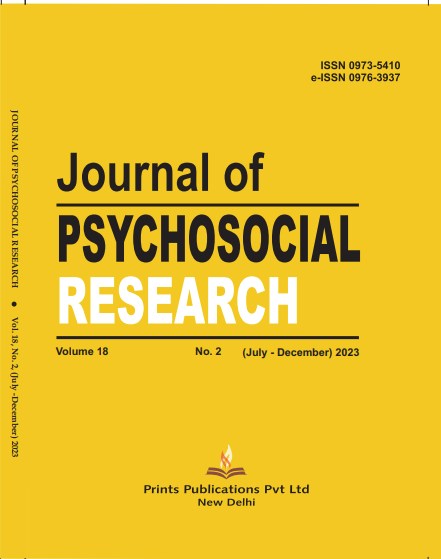Journal of Psychosocial Research
Current Volume: 20 (2025 )
ISSN: 0973-5410
e-ISSN: 0976-3937
Periodicity: Half-Yearly
Month(s) of Publication: June & December
Subject: Psychology
DOI: 10.32381/JPR
Investigating the Interdependent Relationship Among Sleep Quality Perceived Stress and Academic Performance of Young Adults
By : Mitali Nargotra, Zuby Hasan
Page No: 265-277
Abstract
In today’s fast paced world, everyone wants to work overtime which results in hampering their sleep quality. Lack of awareness of the negative effects of low sleep quality in individuals is alarming and is a major contributing factor to mental health issues like stress which may affect the level of academic performance. The focus of this study is centred on the assessment of the interdependent relationship among sleep quality, perceived stress and academic performance, with a focal point on the gender differences. A total of 160 young adults (80 males, 80 females), aged 18-26, were sampled. Sleep quality was treated as the independent variable, while Perceived Stress and Academic Performance were treated as dependent variables. Analysis employed The Pittsburgh Sleep Quality Index, The Perceived Stress Scale, and Academic Performance Scale, utilising Pearson correlation, linear regression, and independent sample t-test via SPSS. Pearson correlation demonstrated significant associations between sleep quality and perceived stress, as well as between perceived stress and academic performance. However, no correlation was observed between sleep quality and academic performance. Linear regression analysis affirmed that sleep quality consistently predicts perceived stress by 16.1%. Gender differences were absent in the relationship between sleep quality and academic performance, but a significant distinction emerged in perceived stress based on gender. The study highlights the significance of improving sleep quality to alleviate perceived stress in young adults, which, in turn, impacts academic performance. Thus, indicating that sleep quality may indirectly influence academic achievement.
Authors:
Mitali Nargotra : Student, MA in Clinical Psychology, Amity University, Noida, Uttar Pradesh.
Zuby Hasan : Amity Institute of Psychology and Allied Sciences (Aips), Amity University, Noida, Uttar Pradesh.
DOI: https://doi.org/10.32381/JPR.2024.19.02.7





